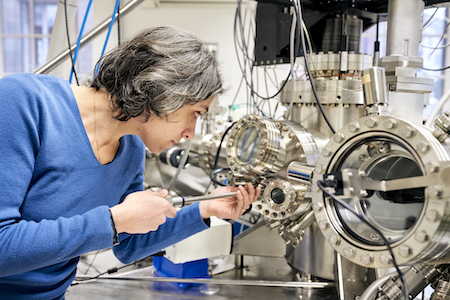While the research teams at ESPCI Paris - PSL are settling into their new building, the question of ecological transition lies at the heart of the school’s transformation: revising the training of engineering students, recruiting dedicated professors, and adapting laboratories to accelerate research on this theme.
A building meeting the highest international standards.
« The new research center brings a host of new features to the laboratories », rejoices Costantino Creton, Director of Research at ESPCI, "such as controlled temperature for experiments, technical fluids available in each chemistry laboratory, fume hoods meeting the latest safety standards, and spacious and technical facilities to house a modern nanotechnology center." The teaching spaces are more spacious and functional, and despite all these added features, the additional energy cost remains modest thanks to the eco-efficient design of the building.

Teaching oriented towards the new ecological paradigm.
« Because the engineers and researchers of tomorrow will inevitably face the major challenges of our society," explains Annie Colin, researcher and mission officer for Ecological Transition, "ESPCI aims to provide its students with the ability to discern and measure on complex subjects." For example, they must acquire skills in the field of low-energy processes or design virtuous synthesis processes using bio-sourced or geo-sourced reagents, green solvents, catalysts, and so on.
To address these issues, ESPCI’s multidisciplinary training in physics, chemistry, and biology is a real asset. "Evolving it to integrate the challenges of transition should not, however, lead us to abandon our primary objective - to train engineers through research - but to adapt it so that engineering students question themselves globally about their role as engineers and the impacts of their practice to choose thoughtful paths," specifies Corinne Soulié, Director of Studies at ESPCI.
Since the 2022 academic year, training in corporate social responsibility and environmental responsibility (CSR) has been offered throughout the curriculum in the form of new dedicated courses and by integrating ecological issues into existing courses. This represents a total of 148 hours of mandatory teaching and 295.5 hours of optional teaching.
To support this evolution, several ongoing recruitments are focused on the following themes: "Physics/Physicochemistry of Polymers," "Chemistry for Transition," and "Electrochemistry for CO2 Capture».
The students are very involved.

Since 2019, engineering students at ESPCI have established PC Durable. This club organizes conferences for the PC community on transition issues (Green Talks). It also conducts waste sorting activities, green walks, and offers organic baskets. In 2021, ten engineering students conducted the school’s carbon footprint assessment, which helped chart the path forward. Meanwhile, the Junior Enterprise PCA is currently undertaking several initiatives: carbon footprint assessments for associations and the IPGG platform, a study on fluorinated oils, and assistance in obtaining the DDRS label for ESPCI. It’s worth noting that during each of these actions, engineering students receive credit for their Student Engagement.
The promising advances in research.
« In terms of research," explains Costantino Creton, "we preserve full freedom of choice for our professors and researchers, while implementing incentives and actively engaging with PSL on French and European project calls focused on ecological challenges. The success of these initiatives could result in substantial funding contributions to our research center».

ESPCI has many unique assets to address the question of ecological transition, such as soft matter, microfluidics, or fluid dynamics. These technologies contribute to ecological challenges such as plastic recycling, reduction of toxic solvents, design of sustainable materials, or biosynthesis of fuels by algae. The transition towards flexible materials (polymers) observed in organic polymer photovoltaic systems and polymer membranes for batteries aligns with the pursuit of renewable energies. Microfluidics allows for redesigning electrochemical energy conversion devices by improving mass transport and fluid control for better efficiency. In fluid dynamics, ESPCI teams work on harnessing wave energy or designing more energy-efficient wind turbine blades. Others research bioconversion, metal-organic framework (MOF) networks, quantum dots, osmotic energy... Or even new technologies for CO2 capture and storage, water desalination, or lithium recovery from seawater. These are promising themes for the future of our planet.







